AMD EPYC 7262 Benchmarks
For this exercise, we are using our legacy Linux-Bench scripts which help us see cross-platform “least common denominator” results we have been using for years as well as several results from our updated Linux-Bench2 scripts. Starting with our 2nd Generation Intel Xeon Scalable benchmarks, we are adding a number of our workload testing features to the mix as the next evolution of our platform.
At this point, our benchmarking sessions take days to run and we are generating well over a thousand data points. We are also running workloads for software companies that want to see how their software works on the latest hardware. As a result, this is a small sample of the data we are collecting and can share publicly. Our position is always that we are happy to provide some free data but we also have services to let companies run their own workloads in our lab, such as with our DemoEval service. What we do provide is an extremely controlled environment where we know every step is exactly the same and each run is done in a real-world data center, not a test bench.
We are going to show off a few results, and highlight a number of interesting data points in this article.
Python Linux 4.4.2 Kernel Compile Benchmark
This is one of the most requested benchmarks for STH over the past few years. The task was simple, we have a standard configuration file, the Linux 4.4.2 kernel from kernel.org, and make the standard auto-generated configuration utilizing every thread in the system. We are expressing results in terms of compiles per hour to make the results easier to read:
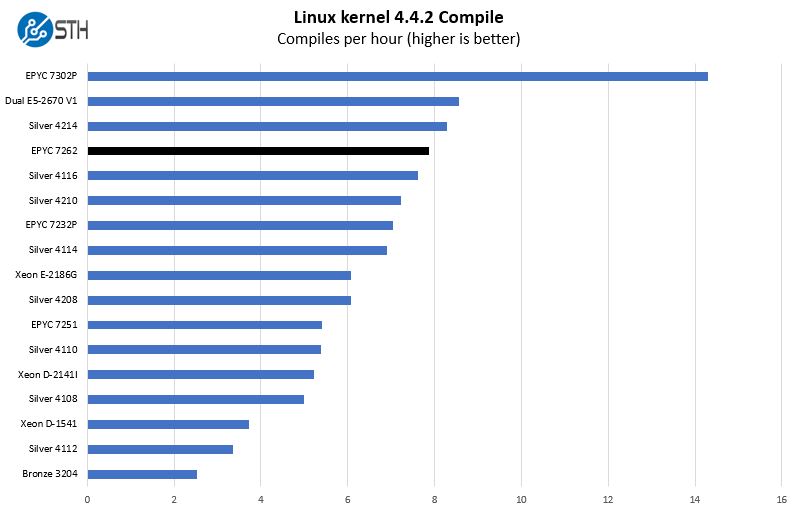
The addition of the dual Intel Xeon E5-2670 V1’s here was an intentional late addition to this chart. With Intel’s slow performance march of the Xeon E5 series, the E5-2670 V1’s were popular and higher-end $1500 8 core server CPUs of their generation. Clock speeds of these 32nm parts are similar (2.6GHz base, 3.2GHz turbo) but they use 115W TDP each, plus have a PCH. So many of them were sold that the Internet, including the STH forums from years ago, had an obsession with running these low-cost parts. Now, at $575 you can use a single CPU on a modern server platform that uses less power and is just about the same speed with the AMD EPYC 7262.
c-ray 1.1 Performance
We have been using c-ray for our performance testing for years now. It is a ray tracing benchmark that is extremely popular to show differences in processors under multi-threaded workloads. We are going to use our 8K results which work well at this end of the performance spectrum.
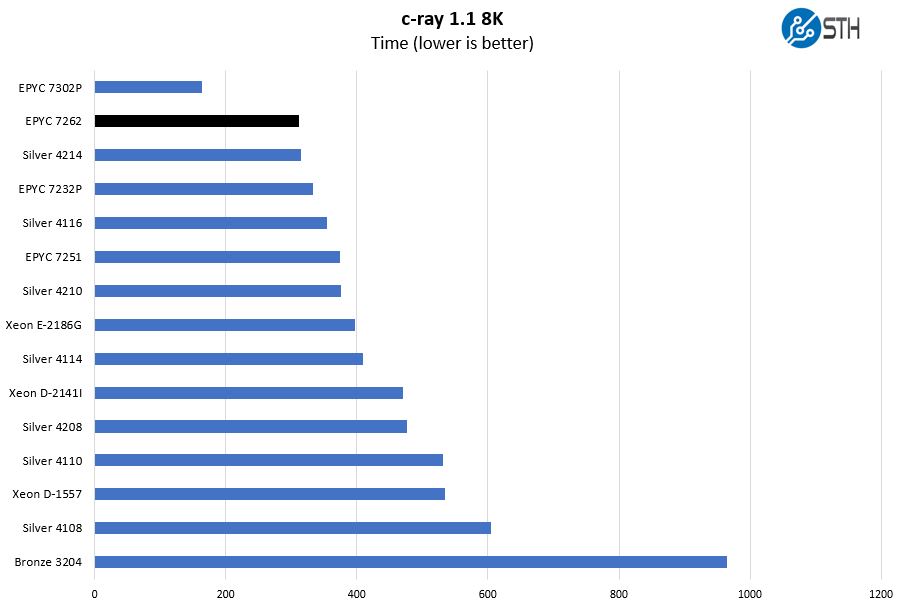
This is an absolute best-case for the AMD EPYC 7262 where it is able to surpass the Intel Xeon Silver 4214 12-core processor. At the higher-end of the stack, AMD is able to consolidate 2:1 (or more) against current-generation Intel Xeon CPUs, as we saw with the AMD EPYC 7702P Review. You will see a more muted range here.
7-zip Compression Performance
7-zip is a widely used compression/ decompression program that works cross-platform. We started using the program during our early days with Windows testing. It is now part of Linux-Bench.
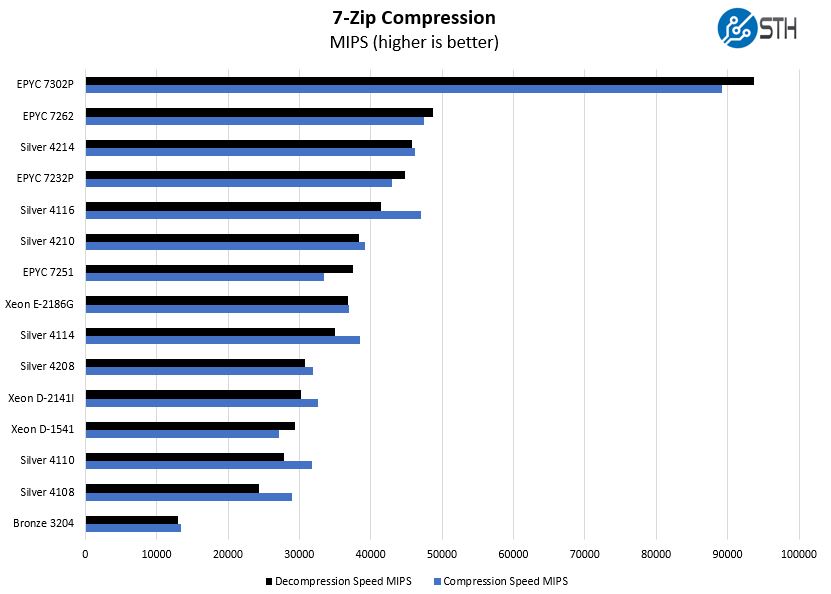
Again, with compression performance, the results are very close. We instead wanted to point here to the AMD EPYC 7302P. In that review, we called the chip a “category killer” because the incremental cost is only around $250. The AMD EPYC 7262 can be used in dual-socket configurations which the “P” SKUs cannot. Still, we see it as a popular option in single-socket servers such as the HPE ProLiant DL325 Gen10 which has a number of base configurations with the chip. For only $250 you can almost double performance by doubling cores. There are very few areas of the market where you can add that much performance at such a low cost.
NAMD Performance
NAMD is a molecular modeling benchmark developed by the Theoretical and Computational Biophysics Group in the Beckman Institute for Advanced Science and Technology at the University of Illinois at Urbana-Champaign. More information on the benchmark can be found here. With GROMACS we have been working hard to support AVX-512 and AVX2 supporting AMD Zen architecture. Here are the comparison results for the legacy data set:
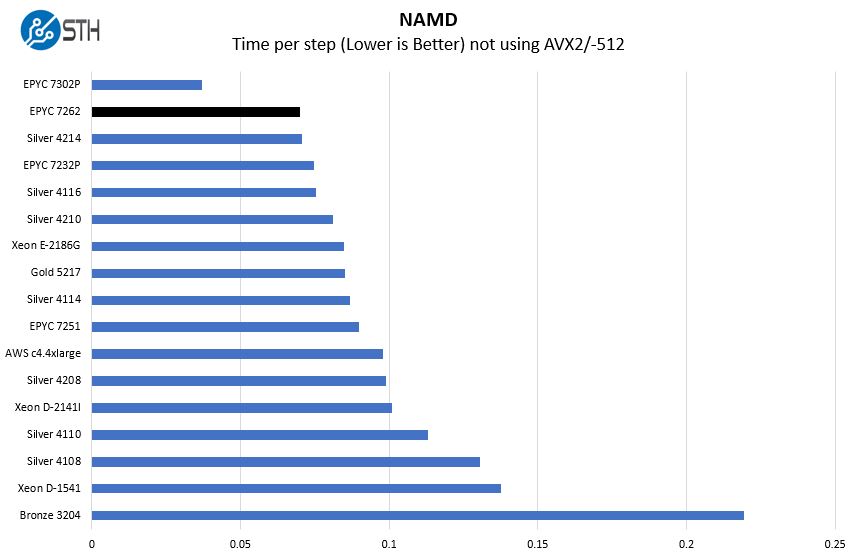
In the previous generation, the AMD EPYC 7251 was perhaps the slightly less expensive. We are seeing a consistent trend of the AMD EPYC 7262 is faster due to higher clock speeds than the EPYC 7251 or the AMD EPYC 7232P.
OpenSSL Performance
OpenSSL is widely used to secure communications between servers. This is an important protocol in many server stacks. We first look at our sign tests:
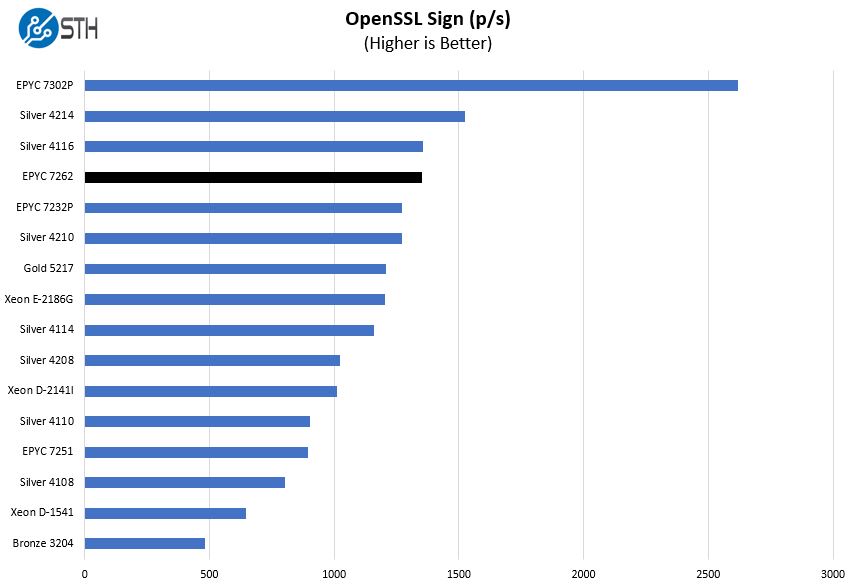
Here are the verify results:
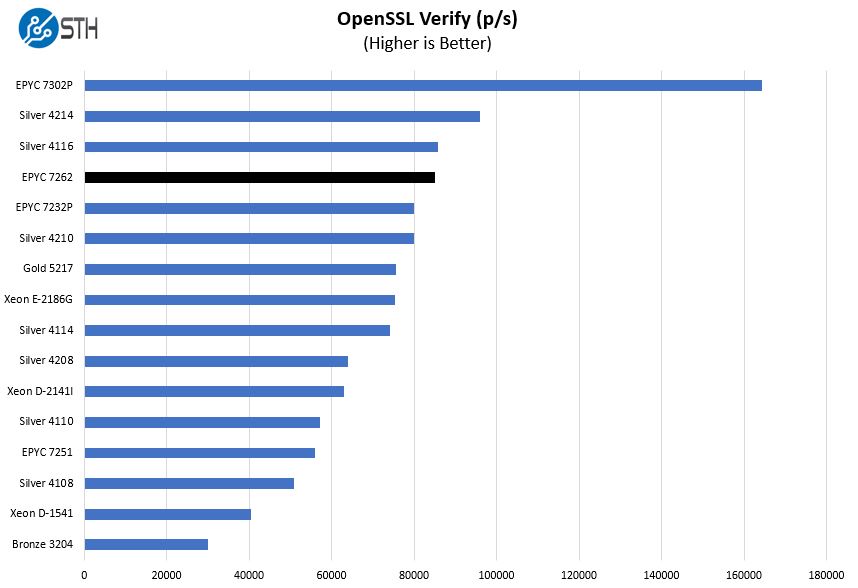
Here we are getting better performance due to the faster clocks and robust caches than the 10-core Intel Xeon Silver 4210. The Silver 4210 is less expensive by a few dollars, but one can see the impact of the EPYC 7262’s high base clock speed on our results.
UnixBench Dhrystone 2 and Whetstone Benchmarks
Some of the longest-running tests at STH are the venerable UnixBench 5.1.3 Dhrystone 2 and Whetstone results. They are certainly aging, however, we constantly get requests for them, and many angry notes when we leave them out. UnixBench is widely used so we are including it in this data set. Here are the Dhrystone 2 results:
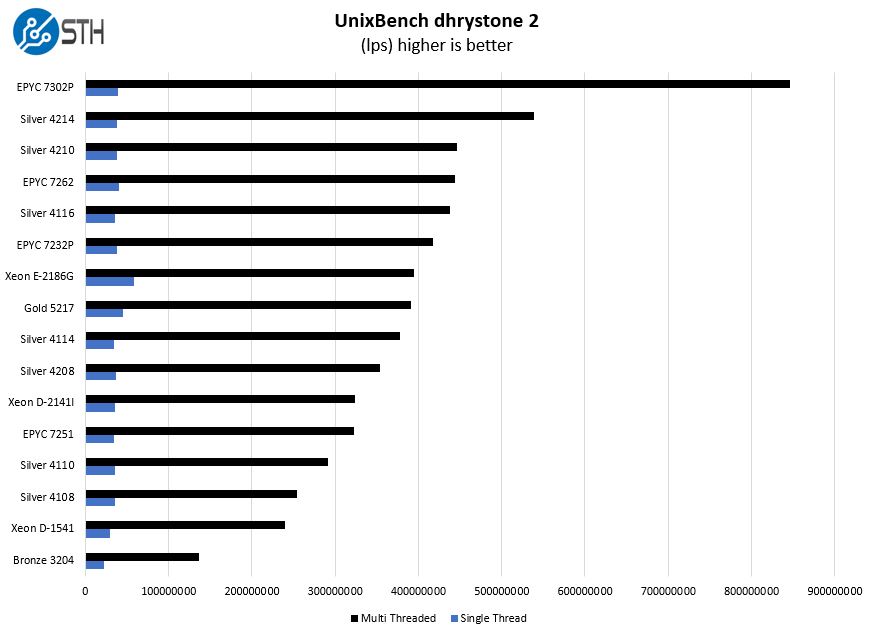
Here are the whetstone results:
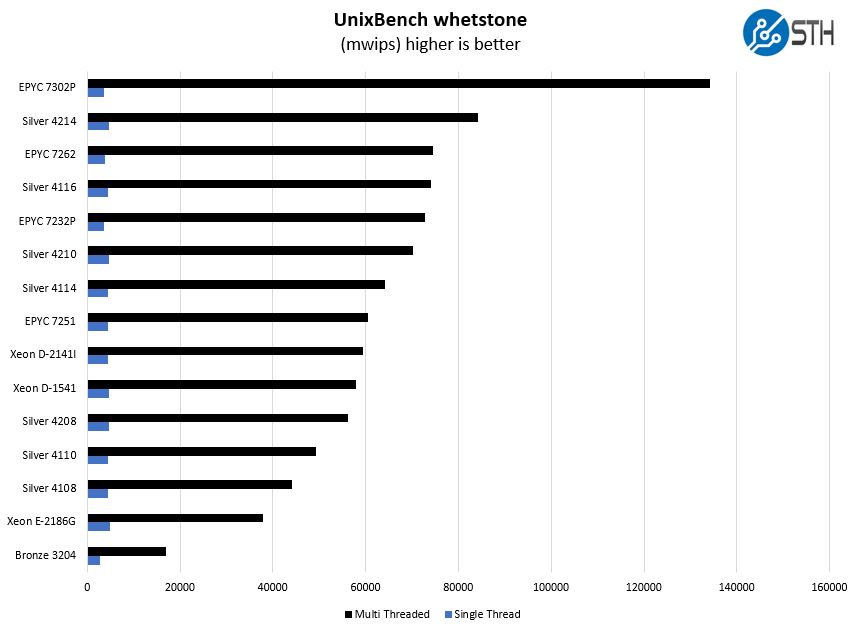
Solid IPC and clock speed numbers mean we see good results here. The most obvious limiting factor is having only 8 cores. That is only 1/8th as many cores as AMD’s top core count SKUs of this generation.
Chess Benchmarking
Chess is an interesting use case since it has almost unlimited complexity. Over the years, we have received a number of requests to bring back chess benchmarking. We have been profiling systems and are ready to start sharing results:
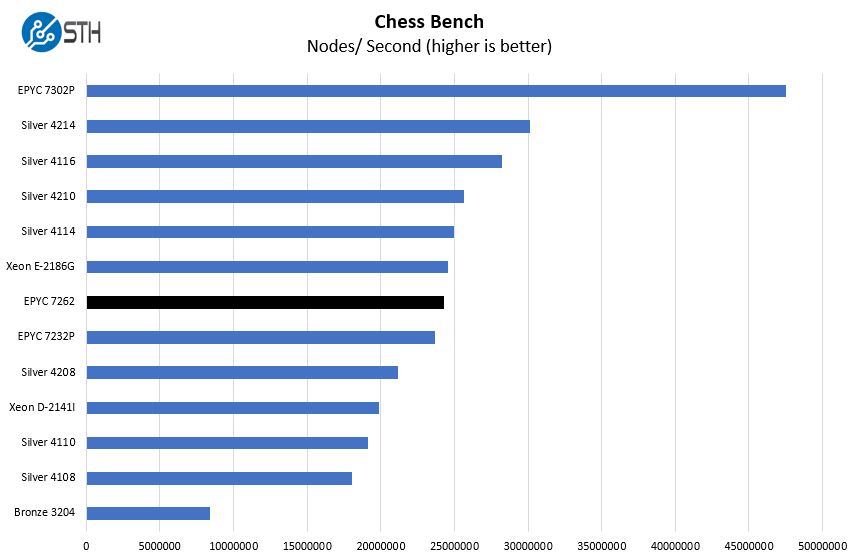
The chess benchmark showed a slightly different pattern than we have seen throughout the test. Here, the AMD EPYC 7262 was between the Intel Xeon Silver 4208 and Silver 4210.
Next, we are going to discuss the market positioning of this chip before getting to our final words.




We were debating those HPE DL325s with these as CDN servers at a few of our international sites. This is a timely review I’ll sent to the team
At least that answers whether we should get the DL325’s with 7262’s or 7302p’s
Thanks for doing these cheaper chips John
Missing is a comparison between the 7262 and its Ryzen counterparts. How does the cache and more RAM channels compare against its consumer counterparts ?
André – the Ryzen is a different class of product to the point that they are not replacements. It is not just cache and RAM channels, but also PCIe.
More importantly, you can get an EPYC server from Dell, HPE, Lenovo, Supermicro but you cannot get a Ryzen server from the big server players.
Unfortunately all tests does not show any advantage of 128MB cache in this cpu. Pity that you don’t have some memory intensive test(s) which would show the advantage of 128MB cache versus 23MB in 7232P. Otherwise 7262 looks as great chip thanks to its huge cache and 3.4GHz max top speed, which is max top speed also of its more expensive siblings.
Just used ‘openssl speed rsa2048’ on my desktop machine (Ryzen 7 3800X) and got:
2090.9 sign/s
72774.1 verify/s
# openssl speed -multi 16 rsa2048
17079.6 sign/s
571428.6 verify/s
Where this cpu is going to shine, is not so much in multithreading, but multitasking. with several very lightly or single threaded apps running at once. Then watch this CPU tear Xeon’s a new hole even more than it already does. And it will pull away much further away from its single socket counterpart.
Hey Pat, just finished reading your article and decided to order an Asrock EPYCD8 MB to pair with the 7262. Do you know if non-ECC memory will work in a server board that requires ECC memory? Figured I’d use what memory I currently have until I could purchase ECC.
Patrick’s GeekBench for this system: https://browser.geekbench.com/v5/cpu/22448
single socket capable?
Single and dual-socket capable, but it does not have the special P series pricing for single sockets
When comparing the 7262 with 7272 and 7282 you forgot about the per socket memory bandwidth (you actually have your own article about it).
Bottom line: the 7262 is the only “entry level” CPU for high throughput streaming content or high performance network file serving (or both). That’s actually quite a unique position coupled with 2xCPU option.
A pitty there is no 7262P…